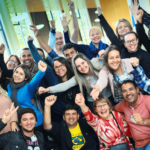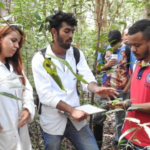
Essi Ryymin, Brian Joyce, Katja Maetoloa, Simo Uusinoka & Maaret Viskari
Recognizing students with special needs is essential at every school level for enhancing student well-being and preventing social exclusion. The project “Right to learn – Skills to teach”, funded by the Finnish Ministry of Education and Culture, aims to develop upper secondary education teacher’s training in the framework of guiding, counselling and supporting students with special needs. The project is related to the reform of general upper secondary education in Finland that aims to emphasize the importance of transdisciplinary guidance and special support. In order to develop the model for teacher training and multidisciplinary guidance the project is interested in experiences of transnational teacher education programmes organized in Häme University of Applied Sciences (HAMK).
Since the School of Professional Teacher Education at HAMK founded its Global Education Unit in 2014, we have been working with several teacher education programmes designed to foster global partnerships in Latin American, Asian, African and European countries.
Our training services place a strong emphasis on practitioner research. All training programmes implement research-based design as a development principle and evaluation of effectiveness and impacts, successes and challenges in collaboration with customers and partners.
The key research interests are 1) Educational Innovations and Shifting Learning Paradigms, 2) Pedagogical Competence and Professional Development and 3) Future Skills and Digitalization in Education (see more from https://www.hamk.fi/research/hamk-edu/global-education-research-development).
We have also had an inspiring opportunity to work as teacher educators in Finnish teacher education programmes, and national in-service training, for example in the recent governmental key projects.
As there are many global and national programmes for teachers running at the same time on our physical and virtual campus, interweaving training and building a global and diverse community of teachers has been a privilege. We have shared workshops, online lectures and organized international parties with music and dance from several continents. Global teacher students have been dialoguing on their everyday educational challenges with Finnish colleagues, and brainstorming solutions to challenges. Finnish teacher students have made it a part of their studies to practice in our partner universities and institutions abroad, for example in Brazil and Portugal.
Interestingly, our preliminary research results as well as our experiences as programme managers and teacher educators indicate that we share similar challenges in education globally, but to different degrees. Here is a sample list of challenges where teachers are seeking solutions, good practices and resources:
Challenge 1: How to enhance students’ social wellbeing and prevent students’ social exclusion?
Teachers reflect on both the community and individual level and how to develop an inclusive learning community: a school for all. How to motivate students to complete their studies, how to decrease the amount of dropouts and how to prevent social exclusion? How to build safe and motivating learning environment? How to deal with socio-emotional challenges and fight against poverty?
Challenge 2: How to make learning engaging and efficient?
Teachers seek to find new, engaging and efficient pedagogy in a paradigm shift from teacher-centredness to student-centredness. Topical questions are, for example, how to individualize and enrich learning in large groups with dwindling resources? How to personalize the learning process? How to implement digital tools in pedagogically meaningful ways and offer access to learning for all?
Challenge 3: How to educate relevant skills and competences for students’ future?
Many teachers are concerned whether these skills and the contents of the school curriculum are relevant to students when they enter a rapidly changing professional and vocational life? What are the generic skills, 21st Century Skills, that students need, and how to develop and assess them? What kind of skills we need to build sustainable societies and prevent climate change? How to include them at every level of education?
Challenge 4: How to support teachers and pedagogical developers in their demanding work?
According to our experiences and observations, many teachers are deeply devoted to their profession and at the same time concerned about their own resources and burden in educational reforms. Teachers are seeking innovative ways to transform their individual work to networked collegiality, to collegial support and shared resources, but it seems that many need practical models and ideas on how to organize shared work concretely. They need to know how to manage team work, pair work, and how to manage change in their personal career?
The global community of teachers already seems to have many answers and many creative, pedagogical solutions to challenges of social exclusion. Our interest is now to find scalable and implementable practices and present them as solutions for a wider audience, to all interested educators. Our other interests are to find out how to support teachers’ resilience, inspiration and motivation in promotion of social and educational wellbeing.
The work continues in several applied research projects in HAMK as well as in shared workshops and publications (e.g. Ryymin, 2019) of international and national teacher educational programmes. For example the project “Right to learn – Skills to teach” aims to develop a model for guidance skills of the teachers in secondary education towards a more transdisciplinary and inclusive approach. One of the future goals is also to include Sustainable Development Goals (SDGs) even more strongly towards global training solutions.
Authors
Essi Ryymin, R&D Manager & Principal Lecturer, HAMK
Brian Joyce, Senior Lecturer, HAMK
Katja Maetoloa, Educational Designer, HAMK
Simo Uusinoka, Senior Lecturer, HAMK
Maaret Viskari, Director, Global Education, HAMK
References
Global Education Research & Development Website. Retrieved 23 April 2019 from http://www.hamk.fi/english/collaboration-and-research/professional-excellence/global-education-rd/Sivut/default.aspx
Ryymin, E. (Ed.) (2019). Global Teachers Change Paradigms – Practical Paths to New Learning. Global Education Innovations Volume 3. HAMKin julkaisuja 1/2019. Häme University of Applied Sciences: Tampere. http://urn.fi/URN:ISBN:978-951-784-811-4





